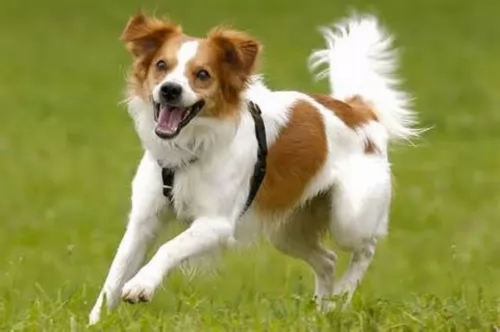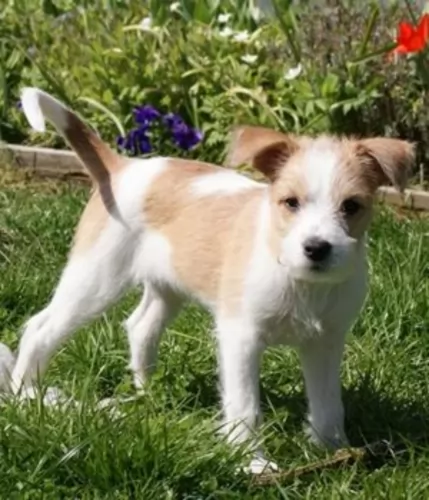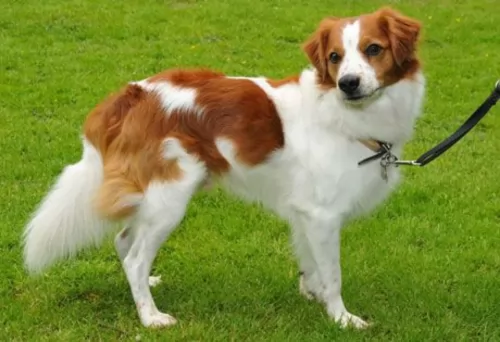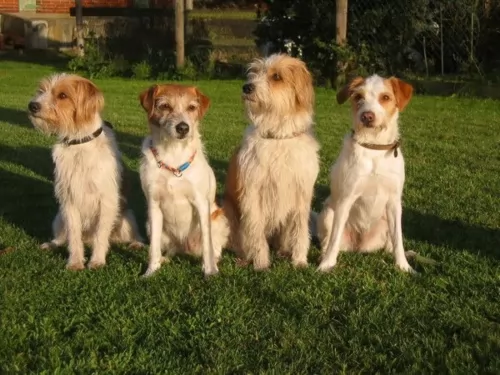 Petzlover
Petzlover Greyhound is originated from United Kingdom but Kromfohrlander is originated from Germany. Greyhound may grow 30 cm / 12 inches higher than Kromfohrlander. Greyhound may weigh 24 kg / 53 pounds more than Kromfohrlander. Both Greyhound and Kromfohrlander has almost same life span. Greyhound may have more litter size than Kromfohrlander. Both Greyhound and Kromfohrlander requires Low Maintenance.
Greyhound is originated from United Kingdom but Kromfohrlander is originated from Germany. Greyhound may grow 30 cm / 12 inches higher than Kromfohrlander. Greyhound may weigh 24 kg / 53 pounds more than Kromfohrlander. Both Greyhound and Kromfohrlander has almost same life span. Greyhound may have more litter size than Kromfohrlander. Both Greyhound and Kromfohrlander requires Low Maintenance.
 The Greyhound belongs to a group of dogs known as sighthounds. This is an ancient sighthound breed dating back a few thousands years.
The Greyhound belongs to a group of dogs known as sighthounds. This is an ancient sighthound breed dating back a few thousands years.
The dog has been bred for racing but today is also a popular pet. They’ve also been used for hunting too because of their keen eyesight and sense of smell.
In the United States there are Greyhounds registered with the American Kennel Club as well as those registered with the National Greyhound Association.
 Many troops of World War 1 and World War II would have some or other mascot that they would keep close to them as a reminder of home. The mascot would also inspire them, giving them hope to endure.
Many troops of World War 1 and World War II would have some or other mascot that they would keep close to them as a reminder of home. The mascot would also inspire them, giving them hope to endure.
A Kromfohrlander dog, ‘Original Peter’ was one such mascot – a scruffy Terrier-type dog that army troops from the USA found in France.
This particular dog was accidentally mated with a Fox Terrier, with the breed essentially developing from the military dog from the 1940s. After 10 years of development, the Federation Cynologique Internationale accepted the breed in August, 1955.
It is still a rare breed, being found mainly in Germany.
 The Greyhound is a tall, muscled, long-legged, slender dog with a flexible spine, a deep chest and exceptional eye sight.
The Greyhound is a tall, muscled, long-legged, slender dog with a flexible spine, a deep chest and exceptional eye sight.
The Males are usually about 71 to 76 cm in height with the females being slightly smaller. The dogs weigh in the region of 27 to 40 kg. The coat of the dog is short and smooth and is found in an assortment of colors, from fawn to white, tan, black and brindle.As far as grooming goes, he is looked upon as a low maintenance breed.
He has a long narrow muzzle, semi-erect/semi-floppy short ears and a long slender tail.
Sometimes referred to as being hypoallergenic, you need to allow your Greyhound indoors as the dog doesn't have an undercoat. He is therefore more susceptible to extreme temperatures. The face is long, narrow and pointed, the ears short and half-erect-half-floppy with a long, thin, whip-like tail.
Intelligent and gentle, the Greyhound is described by those who have owned them as wonderful pet. They are somewhat aloof around strangers but love their own human family. This is a non-aggressive, gentle, docile, calm dog. They are loving and get on well with their entire family, whether human beings or pets.
They’re sensitive dogs who appreciate quiet, calm environments. They may be quiet, but they are still social, loving the company of their family. They’re not great barkers and because they are non-aggressive, they don’t make wonderful guard dogs.
 Fondly referred to as the Kromi or the Lander, the purebred Kromfohrlander, known as a companion dog, is medium sized.
Fondly referred to as the Kromi or the Lander, the purebred Kromfohrlander, known as a companion dog, is medium sized.
Both males and females stand at roughly 38 – 46cm in height and they weigh about 9 – 16kg.
They have two different coat types – the smooth haired one and the rough haired one, both coming with a soft undercoat. The dog is a moderate shedder. If you really want to be smart then the smooth coat is referred to as Glatthaar and the wire-haired Rauhaar. The color of the coat is white with brown, orange tan markings with the ears and part of the face mostly covered in the brown/tan markings.
The head of the dog is fairly round shaped and he has half-erect, half floppy ears. His legs are straight and firm and the medium length isn’t docked.
The Kromfohrlander is known for being a loving family pet that loves nothing more than staying within reach of one of his human family members. This closeness with his people means that he can adapt to life in the city or the countryside, so long as he is with his humans.
Wherever he lives though, because he is such an active dog he will require a good dose of mental- and physical stimulation. He is a docile dog, but not timid and not aggressive either, being friendly and amicable by nature. He makes a great playmate for children and is willing to get along with other pets in the home too.
 The Greyhound, forgetting about the racing part, makes a superb pet too. He won't do well in a household where there are screaming, noisy children and adults as he wants a quiet home to live in.
The Greyhound, forgetting about the racing part, makes a superb pet too. He won't do well in a household where there are screaming, noisy children and adults as he wants a quiet home to live in.
He can get on well with kind, gentle, respectful children as well as with pets in the home. Just like any dog, he will also need training and socialization as this can build up his confidence and then he knows how to please his owners and what they expect.
The Greyhound will require a gentle, fair, kind owner who understands his need for peace and quiet, and then he becomes a most wonderful devoted, loyal and loving pet.
 The Kromfohrländer is one of those dogs that has been bred specifically to be man’s best friend.
The Kromfohrländer is one of those dogs that has been bred specifically to be man’s best friend.
When you delve into his history you see that he has never had any particular role as a working- or hunting dog but that he has been bred to be a companion animal.
He can’t be left alone for too many hours as his very nature makes it that he longs to be around his human family constantly. He is therefore not a dependant dog, relying totally on his human family for his sense of well-being.
Low maintenance, easy-going, loving, devoted, lively and social, when you bring the medium-sized Kromfohrlander into your home, it won’t be long before he will have crept into your heart as well.
 Greyhounds are a wonderfully healthy dog breed and with good care can reach 14 years of age. They aren't prone to many genetic illnesses and unlike so many other dog breeds, this is one dog that doesn't battle with hip dysplasia – in fact it is almost unknown among this tall, slim dog breed.
Greyhounds are a wonderfully healthy dog breed and with good care can reach 14 years of age. They aren't prone to many genetic illnesses and unlike so many other dog breeds, this is one dog that doesn't battle with hip dysplasia – in fact it is almost unknown among this tall, slim dog breed.
The Greyhound does however, have a deep chest and this is what makes him vulnerable to bloat or gastric torsion. You have to take action quickly if you detect bloat – the stomach swells up – as this is a life-threatening condition that can occur quickly when air is trapped in the stomach. The stomach can become twisted.
Make sure your Greyhound doesn't gobble his food too quickly and preferably give him smaller meals as opposed to one or two large bowls of food.
 Feisty, energetic, full of life, entertaining and comical, your Kromfohrlander is intelligent too and with good care, exercise and lots of love your dog will maintain all these good characteristics and reach anything from 12 to 16 years of age.
Feisty, energetic, full of life, entertaining and comical, your Kromfohrlander is intelligent too and with good care, exercise and lots of love your dog will maintain all these good characteristics and reach anything from 12 to 16 years of age.
However, there are some dog illnesses that could affect your dog such as hip dysplasia, ear- and eye infections such as lens luxation which can actually cause loss of vision, cancer, diabetes, epilepsy, bloat and others.
Dogs that are ignored in terms of getting enough exercise are prone to weight gain and this in itself can lead to joint disease and other illnesses.
 Your Greyhound’s breeder will be the best guide for the type of- and the amount of dog food your hound will need. Of course, a growing puppy has different nutritional needs from a mature or senior Greyhound.
Your Greyhound’s breeder will be the best guide for the type of- and the amount of dog food your hound will need. Of course, a growing puppy has different nutritional needs from a mature or senior Greyhound.
Growing puppies and young dogs use a lot of energy so they will require a diet rich in protein. According to Greyhound experts, an adult Greyhound dog will need an average daily caloric intake of 1740 calories.
Older dogs and those that have been spayed or neutered will need less. Apart from the very best quality kibble, your Greyhound will most certainly require raw meat from time to time. You can also give him some cooked chicken, vegetables and brown rice. He should have access to a constant supply of fresh, cool water.
The Greyhound's coat is smooth and short and he sheds very little so he will only need a gentle brush-down once or twice a week.
Having a relaxed lifestyle is what your Greyhound will love. He is a dog that needs to spend time indoors. When outdoors, whether you live in the city or the country, he will need daily walks and a run in the park regularly.
Just because he is a sprinter, it isn't wise to take him with you with cycling or jogging as he is geared for a short burst of speed as opposed to a long run.
 Your Kromfohrlander has two coat types - wirehaired or smooth. Don’t be overwhelmed by the brush and comb selections there are to keep his coat shiny ad healthy.
Your Kromfohrlander has two coat types - wirehaired or smooth. Don’t be overwhelmed by the brush and comb selections there are to keep his coat shiny ad healthy.
The idea is to simply choose a brush such as a bristle brush that can be used on all coat types. A brush like this will allow you to gently brush your pet’s coat to remove grass, dust and burrs and to make it a pleasant experience for your pet.
You want your Kromfohrlander to look forward to his brushing session. You can check him over for lumps, fleas and ticks at the same time.
Other grooming routines that your Kromfohrlander will need is nail clipping, checking inside and outside the ears for fleas and ticks as well as wax- and dirt build-up as well as teeth brushing. If teeth brushing for dogs is new to you there are pet groomers and even your vet who will offer this important service for you.